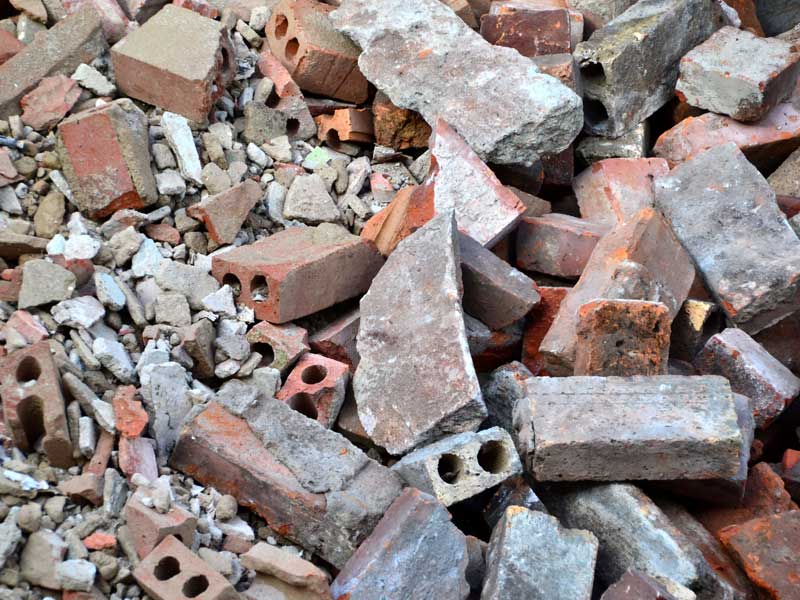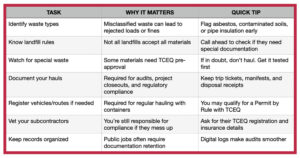
When you’re running a crew on an infrastructure job – whether it’s highway improvements, underground utilities, a wind turbine platform, or municipal drainage systems – construction waste disposal is a logistical challenge.
You need to handle it efficiently, legally, and with as little disruption to your timeline as possible.
In Texas, waste disposal is tightly regulated, especially on public infrastructure projects. The rules may not always be clear, but ignoring them can cause delays, fines, or worse – reputation damage.
This article will help you stay in compliance with state requirements while keeping your job moving.
Understand the Waste Disposal You’re Dealing With
Not all waste is treated the same, especially on large-scale infrastructure sites. Before you start hauling debris off-site, it’s critical to know how it’s classified under Texas law.
Common types of waste on infrastructure jobs include:
- Concrete, asphalt, rebar, and soils: These fall under construction and demolition (C&D) debris, regulated as Municipal Solid Waste (MSW).
- Old utility infrastructure: Items such as lead jointed pipe or asbestos-containing conduit may be regulated as Special Waste.
- Industrial byproducts: Waste from working near factories or facilities could be regulated as Industrial Waste or Hazardous Waste.
The Texas Commission on Environmental Quality (TCEQ) oversees all these waste streams. Misclassifying waste for disposal can result in rejected loads, unplanned costs, or liability issues.
Tip: Make waste classification part of your pre-job checklist. Line up proper disposal facilities before you dig, especially on projects involving demolition or utility replacement.
Hauling for Waste Disposal: What’s Required in Texas
Infrastructure contractors may do waste hauling either in-house or through trusted subcontractors. But Texas rules still apply.
- If you’re transporting waste in containers to a landfill on a regular basis, you may need to register your vehicle or hauling route with TCEQ under a Permit by Rule (PBR).
- On public projects, keep documentation like trip tickets or manifests on file. These may be reviewed as part of compliance audits.
- If you subcontract your hauling, verify that your hauler understands state requirements for demolition waste disposal and isn’t cutting corners.
Tip: Most infrastructure work involves coordination with city, county, or TxDOT officials. So, having your disposal documentation in good order keeps everyone out of trouble.
Special Waste Disposal: A Hidden Risk on Public Works Projects
One area where infrastructure jobs often run into trouble is special waste. This includes anything that can’t be treated as regular C&D debris due to contamination, toxicity, or regulatory classification.
Examples from infrastructure sites:
- Soil or sediment from storm drain or culvert cleanouts
- Pipe insulation or ductwork containing asbestos
- Wastewater sludge or catch basin grit
- Debris from fuel or chemical spills on job sites
These materials can’t be taken to a landfill without prior authorization from TCEQ. In many cases, testing is required before transport is even approved.
Tip: Even if you’re not the source of the waste (e.g. you’re excavating near an old gas station), you can still be responsible for handling it properly.
Keep Waste Disposal Legal
You don’t need to become an environmental compliance expert! But you do need a basic system for waste disposal to stay within the rules!
Here’s what helps:
- Identify likely waste types before starting – especially on urban, industrial, or aged infrastructure.
- Talk to your landfill up front about what materials they accept and what documentation they require.
- Keep records – trip logs, landfill receipts, and any TCEQ authorizations – especially for audits or closeout packages on public projects.
- Consult your subcontractors. Make sure they’re registered, insured, and compliant with state and local rules.
Cowboy Trucking Can Help with Waste Disposal
Waste disposal on infrastructure jobs is high-volume, high-visibility, and often under public scrutiny! Managing it well isn’t just about keeping clean records. It’s about delivering a complete, compliant job that improves your ability to win more public work in Texas.
Call us if you’d like us to partner with you from our decades of experience in disposing of waste safely. Let’s talk.
Takeaway:

